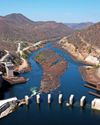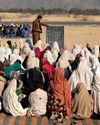
SINCE ABRAM KAMERAZ HAD BEGUN to commute by train from Leningrad (now St Petersburg) to the suburban town of Pavlovsk in the summer of 1941, attacks by enemy planes had become a frequent cause of delay. Through the carriage window, Kameraz saw the road was littered with bodies.
These men, women and children had been killed by German planes, which had strafed and bombed the crowds of refugees as they fled towards the city. As Kameraz caught the silhouette of a German Stuka cresting the horizon, the driver stopped the train and ordered the passengers to run to a nearby ditch for cover.
Kameraz, 36, was a potato specialist, one of about 50 botanists who worked at the Plant Institute, the world's first seed bank, situated off St Isaac's Square in the centre of Leningrad. The institute's potato collection contained 6,000 varieties, including many rare cultivars -the largest, most diverse potato collection yet gathered in history, a crop of inestimable scientific importance. And right now, hundreds of delicate South American specimens were planted in sheds in the fields on the outskirts of the city, in the path of the advancing German army.
Throughout August, Kameraz and his colleague Olga Voskresenskaya had made regular trips back and forth between Leningrad and Pavlovsk. But after the enemy planes fired on the trucks carrying potatoes near the Pulkovo Heights, the military drivers had refused to take them. So, Kameraz had decided to stage today's reckless final rescue attempt alone. Every potato he could save and return to the seed bank in the city centre increased the chances of preserving his important work.
هذه القصة مأخوذة من طبعة November 22, 2024 من The Guardian Weekly.
ابدأ النسخة التجريبية المجانية من Magzter GOLD لمدة 7 أيام للوصول إلى آلاف القصص المتميزة المنسقة وأكثر من 9,000 مجلة وصحيفة.
بالفعل مشترك ? تسجيل الدخول
هذه القصة مأخوذة من طبعة November 22, 2024 من The Guardian Weekly.
ابدأ النسخة التجريبية المجانية من Magzter GOLD لمدة 7 أيام للوصول إلى آلاف القصص المتميزة المنسقة وأكثر من 9,000 مجلة وصحيفة.
بالفعل مشترك? تسجيل الدخول

Friendship interrupted
They were best mates. Then one had a baby, while the other struggled to conceive. They share their brutally honest takes on what happens when motherhood affects friendship

KERNELS OF HOPE
During the siege of Leningrad, botanists in charge of an irreplaceable seed collection, the first of its kind, had to protect it from fire, rodents-and hunger

A new horizon' The inverse link between cancer and dementia
Scientists have long been aware of a curious connection between these common and feared diseases. At last, a clearer picture is emerging

Across the universe
Samantha Harvey won the Booker prize with a novel set in space. Yet, she says, Orbital is actually 'a celebration of Earth's beauty with a pang of loss'

Frank Auerbach 1931 -2024
Saved from the Holocaust, this artist captured the devastation of postwar Britain as ifits wounds were his own but he ultimately found salvation in painting

Seven lessons I've learned after 28 years as economics editor
Margaret Thatcher was Britain's prime minister and Neil Kinnock was leader of the Labour party.

Droughtstricken dam leaves economies powerless
A ll is not well with the waters of Lake Kariba, the world's human-made lake largest A punishing drought has drained the huge reservoir close to record lows, raising the prospect that the Kariba Dam, which powers the economies of Zambia and Zimbabwe, may have to shut down for the first time in its 65-year history.

Let this be the end of these excruciating celebrity endorsements
I wish celebrities would learn the art of the French exit. But they can't, which is why Eva Longoria has announced she no longer lives in America. \"I get to escape and go somewhere,\" she explained.

Alive, but unable to thrive under absolute patriarchy
Since the Taliban returned to power, women and girls have tried defiance, but despair at their harshly restricted lives

‘It's tragic’ Reflection in the wake of Amsterdam violence
Carrying signs scrawled with messages urging unity, they laid white roses at the statue of Anne Frank, steps away from the home where her family had hidden from Nazi persecution.